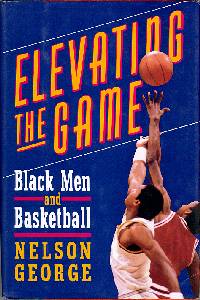By Nelson George
![]()

![]()
Ranking:
![]()
This book was disappointing. It certainly is a book with a cultural angle to it. I bought it because the inside cover said that it told stories from people like Bill Russell, Connie Hawkins, and Wilt Chamberlain. I figured the author did some interviews and gleaned new information about players I wanted to know about. Wrong! He simply read the their books and quoted passages. This book is kind of like a research paper. He does have an exhaustive bibliography in the back, so his research is commendable.
He starts from the early days of basketball. I found his information on the small black colleges and the stories about the barnstorming teams like the Harlem Renaissance and the Harlem Globetrotters, as well as his stories of street ball legends like Earl "the goat" Manigault to be enlightening. However, the book did too much self-promoting of his book "The Death of the Rhythm and Blues." I also felt at times that I should be playing "Fight the Power" in the background while I was reading this. He was too extreme in my opinion--he kind of reminded me of the "radical" comic book writer in the movie "Chasing Amy." I enjoyed stories of black men overcoming racial bigotry and keeping their dignity and fighting back--stories like Bill Russell's Go Up for Glory and Chet Walker's Long Time Coming. These were told from an honest standpoint. This book seemed like the author had an axe to grind and has a bitter separatist tone: he has the attitude that there is "black" basketball and "white" basketball (which to me is racist in nature), rather than just saying it is all "basketball." The other things I didn't care for was that he is a music writer and doesn't write basketball well, and what really put the sour taste in my mouth is his idiot logic that Bill Russell was better than Wilt Chamberlain and Magic Johnson was better than Larry Bird because their respective teams won more titles. I find this argument to be the height of stupidity. Comparing individual players based upon the collective effort of 12 individuals and one coach is beyond me. (Using this logic, if you put me on the original Dream Team and brought me in to guard Toni Kukoc for the last 3 minutes--when the Dream Team was up by 40 points -- sure Kukoc would light me up for 30+ points, but since my team won, I am a better player? STUPID!) When he inserted this clueless statement, I lost all respect for the author. I don't have a beef with Magic-Larry comparison. They were both great ballplayers. However, I do believe that Wilt Chamberlain is the greatest player in history and morons like Nelson George trying to belittle the Big Dipper puts a burr under my saddle!
Don't get me wrong: the book isn't an entire waste of reading. It has some very enlightening stories on pre-1950s basketball that is hard to find anywhere else. But after 1960, the time I was more interested in, I found it to be shallow, slanted, and at times ignorant.
Insight: 2
History: 1920-1991
Readability: 2
Elevating the Game: Black Men and Basketball. Nelson George. Harper Collins Publishers. 1992.